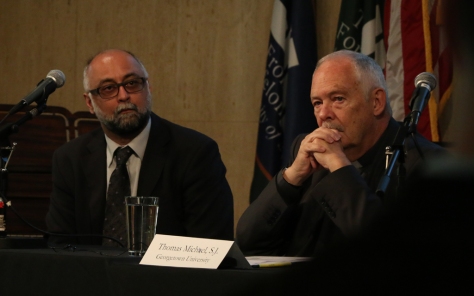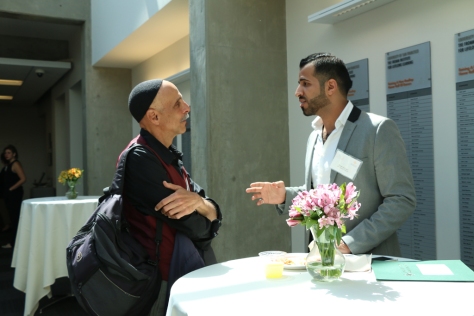Angela Markwith
Staff Writer
This past week, USF hosted members from 24 of the 28 American Jesuit universities. Two full days and the entirety of the Fromm complex was dedicated to discussing an increasingly pressing issue: the presence of Islamic and Muslim culture on Jesuit campuses.
On Apr. 10 and 11, the overall objective was to examine the evolution of the mission of Catholic Jesuit universities in light of the growth of Islamic studies and the increase in Muslim faculty, staff, and students on campus.
This conference aimed first to bring together faculty and staff in order to work on issues of Christian-Muslim relations at Jesuit colleges and universities. It also aimed to address concerns of diversity, interreligious engagement, institutional mission and identity, and teaching in relation to the growth of Islamic studies and Muslim populations at Jesuit institutions.
The conference started early both Friday and Saturday morning and concluded Saturday afternoon. Throughout both days panels consisting of representatives from Jesuit universities including, Fordham University, Santa Clara University, and Georgetown University, spoke on their own opinions on how to improve the relations between Islamic and Christian students. After each panel session, representatives in the audience were given time to ask questions to those that spoke, and then convened into small groups to talk about what had just been discussed.
According to Laura Johnson, professor of Theology at Immanuel College in Boston, the conference was an excellent step forward in advocating for improved relations between Islamic and Christian cultures on individual campuses, while also boasting strong speakers. “It’s really rare to be at a conference where all of the speakers are really good,” said Johnson.
Each speaker presented a different viewpoint on why the presence of Muslim and Islamic cultures should be something that is heavily discussed and how to better support Islamic traditions on Jesuit campuses.

James Morris, a professor at Boston College, presented the idea that students should be given the opportunity to take “explorations abroad” in the session called “Teaching, Curricula, and Education.” These “explorations abroad” would differ from the normal study abroad options given to students, as they would advocate the exploration of culture and primarily focus on sending students to Muslim/Islamic countries.
“Meeting people and sharing different ideas ultimately would result in the breaking down of stereotypes,” explained Morris.
Each speaker of the conference seemed to present the idea that learning about a new religion can help a person of faith better understand their own religion. Hans Harmakaptura, a representative from Boston College strongly believed this to be true. “Studying other religions can really help you grow in your own faith,” said Harmakaptura.
Imam Yaha Hendi, chaplain at Georgetown University, grabbed the attention of the audience when he advocated for a new way to discuss the assimilation of different religions in a session on Saturday called “Student Life, Community Outreach, and International Networks. “I believe in the term intrafaith as opposed to interfaith,” expressed Hendi, “we are not composed of different faiths, but rather we are all composed of one faith that we express in different ways.”
The conference ultimately highlighted different perspectives of each Jesuit community and aimed to advocate a stronger sense of engagement, as engagement of different ideas and perspectives provides more room to grow.

Most conference members believed that integrating Muslim and Islamic tradition at Jesuit universities would prevent violence, fight against ignorance and discrimination, celebrate diversity, and be an example of different communities coming together to live in harmony.
Santa Clara’s Director of Campus Ministry Lulu Santana brought up the issue of space, or lack there of, for students of Islamic and Muslim tradition. She explained that at Santa Clara University there used to not be a specific space solely dedicated for Muslim students, where they could actively pray and practice their faith. Santa Clara was more of a “hotel for the faiths” as opposed to a “home for the faiths,” a phrase coined by Marcia Hermansen, Professor of Islamic World Studies at Loyola University of Chicago.
Thus, the Campus Ministry at Santa Clara created a Meditation Room where students could practice their religion in a space dedicated to promoting the free expression of one’s religion. The work of Santa Clara’s campus ministry was an example to members of the conference of how they can advocate for their own changes in their own universities to create a safe and accepting environment for all students, regardless of their religion.
As a university built on the foundations of diversity and equality, USF took an even greater stride in working towards establishing a more informed and accepting community of Jesuit Universities. “Ultimately we must work together on evolving the needs of the Muslim and Islamic communities in Catholic universities,” said Santana.

